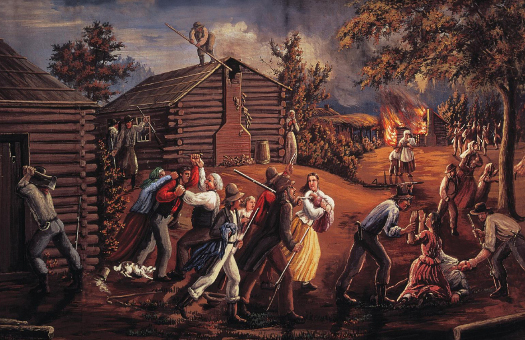
by John P. Pratt
8 Apr 2017, 1 Dog (SR), 1 Res (V), 1 Prime (M,UM), Consecration (PH), Passover (E), 1 Quickening (UMa), 1 Aries (S)
©2017 by John P. Pratt. All rights Reserved.
| 1. Campbellite Example |
| 2. The Commandments |
| 2.1 Sermon on the Mount |
| 2.2 Law of the Church |
| 2.3 Law of Zion |
| 2.4 To the First Elders |
| 3. Training Wheels |
| 4. Conclusion |
| Notes |
Latter-day saints believe that the city of Zion (the New Jerusalem) will be built on the American continent where some of the remnant of Israel will literally be gathered (Tenth Article of Faith). A failed attempt to build the city was made in 1831-1833 in Independence, Missouri. In 1832 the Lord warned the saints that they were under condemnation for having taken lightly the new covenant of the Book of Mormon, especially to actually keep its commandments as well as other laws (D&C 84:54-57). Has that condemnation been removed? Apparently not because in the LDS priesthood teaching manual for 2015 those very verses are quoted, concluding that "we must repent" (p. 127).
 |
The saints were driven into the wilderness of Utah where they were at least somewhat free from persecution. Then Church leaders did all they knew how to prepare the saints to return to redeem the land in Missouri for the city of Zion by trying to teach them to live the laws of Zion. In the 1870s some cities attempted to live the United Order, but eventually they failed. Attempts were also made to at least have the saints own some businesses as co-ops, such at Zion's Cooperative Mercantile Institution (ZCMI, founded 1868) as well as the Church owning a sugar house and lumber mill. Eventually President Heber J. Grant told the saints that the Church leaders had given up on the members and were selling those businesses because the members loved Babylon and preferred to buy products from New York instead of those produced locally.[1] Now all of those efforts to prepare us to build the city of Zion have apparently been abandoned. Thus, we now appear to be much farther away from living the celestial principles of Zion than were those early saints. And they failed! Is there anything that can be done to help us reverse the trend and to actually prepare to build Zion?
This year's LDS priesthood manual emphasizes that we should be engaged in this work. On page 85 it quotes Pres. Gordon B. Hinckley encouraging us to build on the foundation that those early LDS saints began:
Their grand objective was Zion. They sang about it. They dreamed about it. It was their great hope.... looking down the years and dreaming a millennial dream, a grand dream of Zion.
What can we do to prepare to build Zion? As we study the reasons that the Lord gave for driving the saints out of Missouri and Illinois, we see that the principal problem was that they did not actually keep the commandments He had given them. He noted that they were good at talking about the commandments, such as caring for the poor, but that they didn't actually practice them. Thus, let us first look at some lists of what commandments were given to different groups of people to at least understand what is expected of us. Then after we know the commandments, we can consider when it is right to alter them to fit special occasions or needs, especially when following promptings of the Holy Ghost.
 |
Parley P. Pratt was a Campbellite with his minister being named Sidney Rigdon. Parley decided to become a preacher himself and when in New York discovered and joined the LDS Church in September 1830, where he continued to preach for that newly restored church. He was called on a mission west the next month and soon found himself near the Campbellites in Kirtland, Ohio. He preached the restoration to them, which is exactly what they had been awaiting. Sidney Rigdon and most of his flock were all baptized into what would be called the Mormon faith. When persecution arose in late 1830 in New York, the Lord commanded the main body of the Church to move to Kirtland in early 1831. The headquarters of the LDS Church was located there for seven years.
Many great revelations were given to the Church in Kirtland. Soon the time came to begin preparations for the building of the city of Zion in Missouri, where the highest laws of the fulness of the gospel would be lived and the fulness of the priesthood would abound. Guess where the office of high priest in the Melchizedek priesthood was restored? That's right, it was at the Isaac Morley farm,[2] where people were already attempting to live the highest level of law even before the Church was restored. Having all things in common would not be a huge change in their lifestyle!
The reason for reviewing this history is to suggest that perhaps we could follow the example which the Campbellites set. That is, perhaps we could attempt to live all of the laws that the Lord has given to His church that we know about to show the Lord that we are serious about preparing ourselves to build the city of Zion. Even with all of the preparation of the Campbellites, the first attempt to build Zion failed and the saints were driven out of Missouri.
Think of just how much farther away most of us are from being ready to live anything like the law of consecration or having all things in common than they were, and they failed! We have become a very materialistic society, selfish and almost worshiping our possessions. There are many more poor and homeless among us than just a few decades ago and that trend is increasing. We are so far from building Zion that the leaders of the Church rarely even talk about preparing to build the city of Zion.
Perhaps we could begin to live the laws and commandments which we have been given and which we are expected to be living right now. It is not my purpose to suggest that we attempt to have all things in common as did the Campbellites. That is a higher law that probably would be best to await for the Lord to initiate through His prophet. After all, that law has been replaced with the lower law of tithing.
About two decades ago, it became clear to me that most Christians, including Mormons, were not living the laws given by Christ in the Sermon on the Mount. I began writing an article on the subject and finally abandoned the idea because the truth was too painful: it did not appear that we had ever lived these laws. It truly put the saints in a bad light and emphasized the very condemnation which the Lord said was the cause of their having been driven out of Missouri and Nauvoo. Now it appears that the time has come to look this problem squarely in the eye because as a people we are getting worse instead of better and the time is drawing near when Zion needs to be built![3]
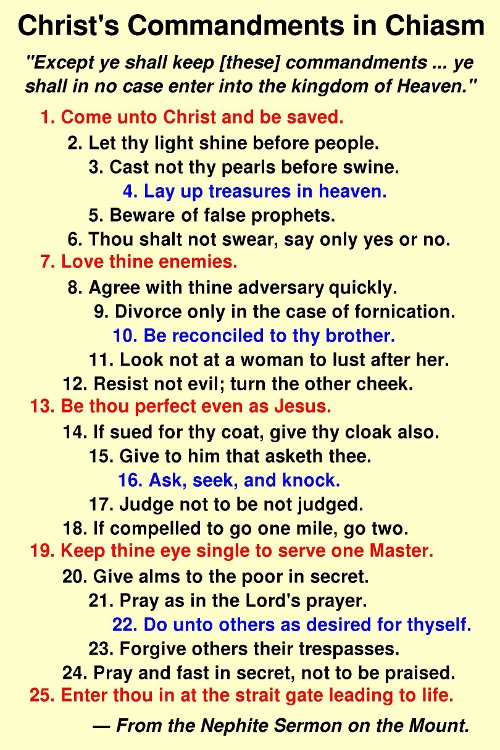 |
Therefore come unto me and be ye saved; for verily I say unto you, that except ye shall keep my commandments, which I have commanded you at this time, ye shall in no case enter into the kingdom of heaven. — 3 Nephi 12:20
That is, the words of that sermon do not contain suggestions or recommendations in case they might be convenient in the modern world of so-called situational ethics, but rather they are commandments! They are given as imperative verbs, meaning they are commands. Jesus made it clear that if we don't obey those commandments that we will not be able to enter the Kingdom of Heaven!
Were you aware of that? No?? Then that just might indicate one reason why the Lord still considers us under condemnation for having taken the Book of Mormon and the commandments too lightly!
Figure 1 illustrates my attempt to find all of the commands in the Nephite Sermon on the Mount and summarize them briefly in a list. They are rearranged somewhat from the order given into a new pattern which is here dubbed a "zig-zag chiasm" to make them easier to memorize if desired. That means they are arranged in related pairs around the blue lines. For example numbers 14 and 18 say similar things, whereas 17 explains why we sometimes fail at 15. The more important are in red and those second in importance are in blue. Of those in red, 13 at the center is the most important, whereas the first and the last (1 and 25) are tied for second, again paired by expressing similar concepts.[4]
This short list is the summary of three chapters of scripture, so it is not exhaustive. Many of them are one-line summaries meant to remind you of an entire paragraph which you are supposed to know. For example, the commandment "Thou shalt not swear" does not refer to avoiding obscene language but to swearing by sacred things to convince others that you are telling the truth. This article is trying to awaken you to the fact that you may not even know what is expected of you and to induce you to go study either Matthew 5-7 or 3 Nephi 12-14 to know what is in the Sermon on the Mount. And as you read the details, be sure to ask a lot of questions about exactly what is meant.[5]
This brief list can be used for us like a quiz to grade ourselves on how many of these commandments we actually live. We might even keep score on how many of the 25 we generally keep. With that in mind, let's go ahead and take some time to read through the list of 25 commandments to see how we measure up.
How did you do? Does that list describe your general behavior? Do you usually obey most of these commandments most of the time? If not, then it is easy to see why we are still under condemnation. We may indeed have treated the covenant of the Book of Mormon and these commandments too lightly!
Now that hopefully you are taking these commandments more seriously, let me caution the reader to avoid a downward spiral into discouragement and hopelessness at the difficulty of fulfilling all of these commandments. They are not to be considered hard and fast rules which never have exceptions. The section of this article "Training Wheels" discusses how these commandments might be modified when it is right (as opposed to convenient!) to do so.
Another important point is that nearly all of the commandments given by the Savior here can be thought of as descriptions of the kind of person who will be in the Kingdom of Heaven. Notice that what many people consider to be all of the requirements to enter the Celestial Kingdom are summarized in the first commandment: "Come unto Christ" and echoed by the last to "Enter in at the strait gate". Both apparently include repenting, having faith in Christ, being baptized in His name and becoming as a little child, sometimes referred to as the doctrine of Christ (3 Nephi 11:38-9). All of the rest of these commandments could be kept well by a Hindu, Buddhist, Muslim, or pagan. They are about being a decent person who treats his fellow man as he would be treated. There is nothing specific to Christianity in them, such as keeping the Lord's Day holy, blaspheming the name of God, nor obeying ordinances. Christ is giving a lot of descriptive examples of how people who are of one heart and mind behave. They don't judge each other wrongly, they love each other, and coexist peacefully. Having awakened to the importance of these commandments of general behavior, it feels to me like this speech could have been given in response to someone asking Jesus to describe the kind of person who will get to live with Him and his Father in the afterlife, or it could have been an answer to a request for some practical guidelines for "How to Become Christ-Like". There are exceptions to all of these commandments, as well as those in the next three subsections, as discussed in the "Training Wheels" section.
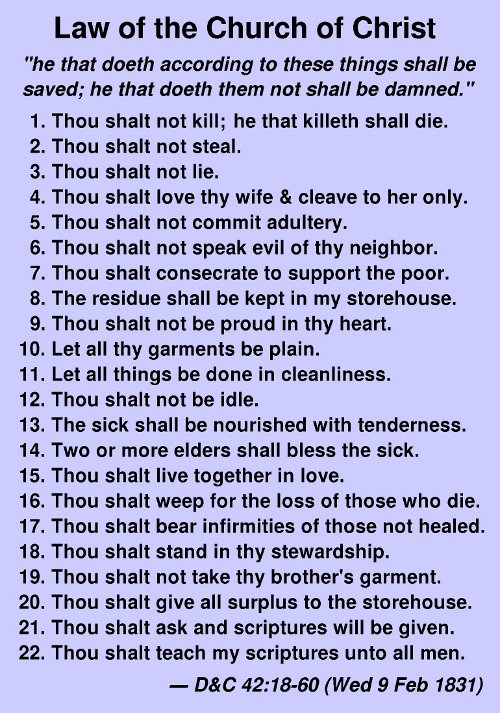 |
Figure 2 is my summary of the Law of the Church taken from D&C 42. There are twenty two commandments included in it. They are interesting both for what is included and what is not. For example some of the laws are from the Ten Commandments, but nothing is mentioned about worshiping idols, keeping one day of the week as a holy day, or honoring parents.
Again the Lord made it clear that His law was required to be kept. At the end He explicitly stated that if the Law was not followed, that the members of the Church would be damned in their progress (D&C 42:60). Let's look at some of the laws and see how well we've done and then consider whether our failure to live these laws might have stopped our spiritual progress.
The familiar laws from the Ten Commandments are what we usually teach to children. Some of those original ten no longer apply, such as keeping the seventh day holy. They are part of the law of Moses which was fulfilled. Although some have taught that the Ten Commandments apply to all people for all time, it now appears that the laws that apply to all living today are the Seven Laws of Noah.[6] For example, God does not expect all people in all nations to refrain from taking His name in vain nor to keep the seventh day of the week holy. That was given only to the children of Israel who had just been taught His holy name and who would be trained for forty years with the 7-day manna cycle to keep the seventh day (Saturday) holy.
The laws given to the Church tend to fall into two categories. The first are identical to the Ten Commandments. We tend to see those and say, as did the rich young man, that we have kept those from our youth. But when the youth asked what he yet lacked, he was told to sell all he had and give to the poor (Matt. 19:20-21). That is very similar to the new law given to the Church. It does not require selling everything, but it does require giving all surplus to the poor and to the Lord's storehouse to give to the poor later (Laws 7, 8 and 20). Are we not very similar to that youth who departed feeling bad because he was rich and that was too much of a sacrifice?
Note that this law did not require the saints to have "all things in common" as did many of the earlier churches of Christ, such as that of the early apostles (Acts 4:32) and of the Nephites (4 Nephi 1:3). It only required to give all of one's surplus to the poor, a much easier law which we could be living individually right now.
Some of the other new commandments tend to be ignored altogether. When is the last time you have heard a strong call to repentance in Church to "let all thy garments be plain, and their beauty the beauty of the work of thine own hands" as required in Law 10 (D&C 42:40). We tend to associate such fashions with polygamist or fundamentalist offshoots from the LDS Church, which are often mocked for actually trying to live the Law of the Church of Christ. Has that commandment been rescinded as now outdated because we need to be like the world and follow the fashions dictated by Babylon (Paris)? Church meetings sometimes look like a fashion show. By the way, note that it does not require that dresses be full length nor that clothing be homemade (only their beauty is homemade). It requires only simplicity with "low-cost" being implied. Remember that one of the first signs of apostasy in the Nephite church after their 200 year "Golden Age" was that some began to wear "costly apparel" which led them to be proud and feel superior to those who failed to follow the new trends. In fact, this practice led almost immediately to the end of having all things in common (4 Nephi 1:24-25).
We might want to mentally run through the list of the Law of the Church in Figure 2 to see how many of the 22 commandments we are now living. I don't know that any of them have been rescinded, but only ignored. LDS members are still free to give all of their surplus to the poor. The whole point of reviewing how the Campbellites chose to live by all of the light they had been given was to suggest that perhaps if we began to live by the light we have already received, then we, like them, might put ourselves in a position to receive more, rather than being damned in our progress.
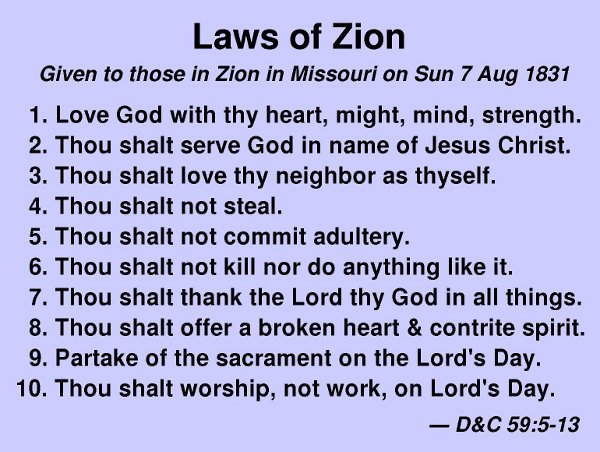 |
The first example of different laws being given to a group was the set of ten commandments given to the little group called to begin to found the city of New Jerusalem in the land of Zion. They prayed to know what law the Lord would have them live, perhaps anticipating that it might be a higher law than had been given earlier to the entire Church. The commandments they were given are summarized in Figure 3.
It will be immediately noticed that several of the Ten Commandments that had been given to Moses again appear. One noticeable difference is that in place of one commandment to keep the seventh day holy, now there are two commandments to keep holy the first day of the week, which we call by the pagan name Sunday, but which the Lord refers to as "the Lord's Day", as did John the Revelator (Rev. 1:10). They were commanded to pray and to partake of the Sacrament of the Lord's Supper on the Lord's Day, as well as to rest from their labors, pay devotions to the Most High, to confess their sins, and to let their food be prepared with singleness of heart (D&C 59:10-13). In the revelation, it often refers to the day as "this day" where one should keep in mind that it was given on Sunday, 7 Aug 1831. To avoid all possible confusion about what day is meant, He refers to "this, the Lord's day" (D&C 59:12).
Note also that abortion is not explicitly prohibited in any commandment, perhaps because the thought of such a heinous crime was unthinkable in 1831 and unspeakable even in my earlier days, but it would certainly be included in the clause in Law 6 to avoid anything "like unto" murder. While many people debate about exactly when a fetus becomes an unborn viable child, few could defend the idea that abortion is not like unto murder.
Again, we might want to look through this list of laws to see how we might measure up and how much we could repent to step up to a better lifestyle.
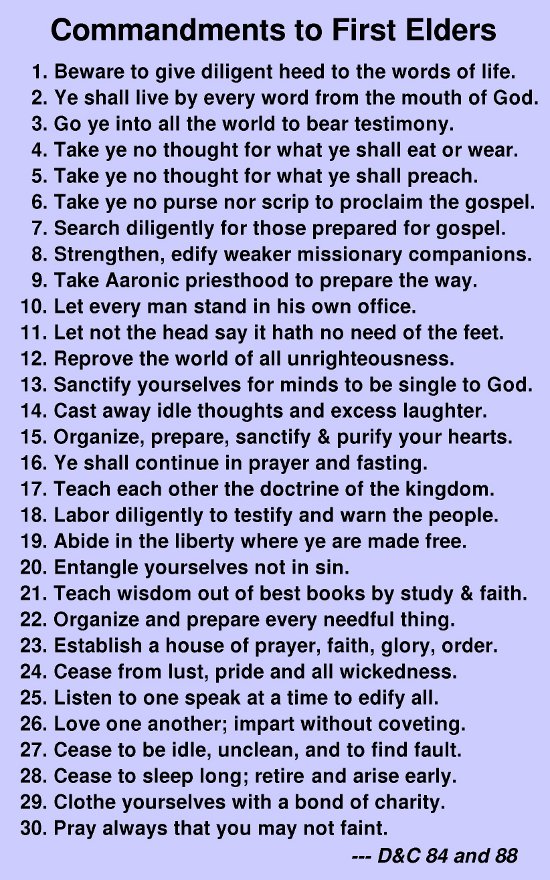 |
Let us consider a set of commandments which was given to a group of at least seven elders. In the revelation they are referred to as the "first elders" and also as the "friends" of Jesus Christ, as were his apostles during his mortal ministry. Each of these men had been ordained a high priest. To the best of my understanding, these seven were the "first elders" in the sense that they were either among the first baptized or were indeed the very first seven baptized and ordained elders.[7] Some of them had been called on missions and were just returning from the Eastern States. Earlier in the Church there were very few high priests; they were ordained principally to be either bishops, in stake presidencies, or on a high council. Thus, the modern equivalent of those for whom these missionary-preparation higher commandments were given would probably be mission presidents, area presidents and apostles.
These 30 commandments are summarized in Figure 4. The first 12 commandments are found in D&C 84 and the last 18 are in D&C 88, given in September and December 1832, respectively. They were selected because each contained a verb in the command form. Note that these were given to a group of men, hence they use the plural forms "ye" and "you" rather than the singular forms "thou" and "thee" as in the lists in Figures 1-3. It is important to understand that in the older form of English used in the scriptures, "you" is a plural form. In our modern degenerated English the words "thou", "thee" and "ye" have all been conflated with the word "you" which often makes it confusing to understand exactly who is meant.
Again, it might be instructive to read through this list of commandments to see how we might do as a "friend of Christ".
In the city of Zion, or the New Jerusalem, will there be signs posted with all of these commandments on them? Will there be signs listing all of the rules to use the swimming pool, which are so commonly seen?
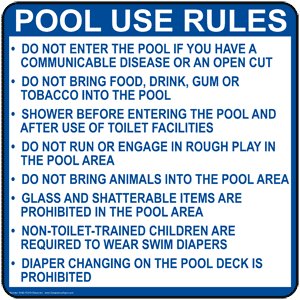 |
In Zion, the only people who will be allowed in will be those of "one heart and one mind" (Moses 7:18). They will already be living the commandments of the Sermon on the Mount. No one will be urinating in the pool because they would not want others to do that. And if they bring a glass container and break it, they will immediately clean it up both to be neat and to prevent injury. Read the rules in Figure 5 and ask yourself how many of them need to be explained to you and which ones you would obey without knowing them. Hopefully there will be no need of "Pool Rules" signs in the city of Zion.
One would expect the same to hold true of all of the laws of Zion. People will love each other and not do anything to stress others out, nor disturb them.
 |
What if we were required to keep the training wheels on forever? How many adults have you ever seen riding a full sized bicycle with training wheels? Think about how much that would inhibit your freedom. You would not be able to go around curves at full speed because you couldn't lean into the curve. You couldn't ride on mountain trails nor perform many of the motions needed for advanced maneuvers.
Let's suppose that someone decided to keep the training wheels on forever because they felt more secure and wanted to be "saved" from falling. How would they look at others who tipped far from vertical when going around a sharp curve. Would not the "upright" rider judge the one bending the "law of uprightness" to be evil and to be taking a huge risk of falling?
And consider the opposite case. Suppose someone was able to ride a bicycle having never used training wheels because it just came naturally to him. What would he think when seeing an adult using training wheels? Would he not think the adult was slightly retarded in his riding skills? Yet the training-wheels rider would probably be proud of his uprightness at all times not realizing how much his riding ability is actual curtailed. Those piously "avoiding even the appearance of evil" (1 Thes. 5:2) are not free to associate with sinners as Jesus did and for which he was criticized (Luke 7:34).
In this author's opinion, the laws summarized in Section 2 are similar to training wheels. If one has no idea what it is to be Christ-like then they provide a great set of guidelines. We can look at those lists of laws and ask ourselves if we are generally the kind of person whose behavior could generally be described by those laws.
Those laws of God are not meant to be a straight jacket to inhibit us from obeying the Voice of our Inner Light (with which all are born) or of the Holy Ghost. That is the opposite of spinelessly buckling under pressure from forces of evil to conveniently employ "situational ethics" to break these commandments at the very time they most need to be followed.
The nearer you get to God, the more the rules change. Nephi was commanded by the Spirit to kill Laban, breaking the general commandment "Thou shalt not kill." In that case it would have been a huge sin not to have murdered Laban, violating a direct and superseding commandment of God.
Jesus broke several commandments to the dismay of the Pharisees and yet He lived a sinless life. It is usually taught that He only broke uninspired extensions of the law of Moses, but what if He actually broke some commandments? If your ox falls into a pit on the sabbath, it might indeed be a lot of work to get him out, but Jesus implied that it would be the right thing to do (Luke 14:5). Thus, if you see Jesus at a swimming pool in the New Jerusalem and He has a glass in His hand, pause before accusing Him of breaking the "No glass at the pool" rule. Again, hopefully there will be no need to have rules posted at the pool. There are exceptions to every law (D&C 88:38).
Early in LDS Church history, the saints repeatedly failed to obey the laws and commandments given them by the Lord and contained in the Book of Mormon. The Lord warned them that they were under condemnation for treating them lightly and eventually they were driven out of the holy lands. If we were to follow the example of the Campbellites, who tried to live by all of the laws of God they could find, we might become better prepared to be allowed to help build the city of Zion. Four sets of commandments and laws are reviewed: those in the Sermon on the Mount, in the Law of the Church, the law given to Zion, and those missionary commandments given to the first elders of the Church. It is then noted that all of those commandments are probably like training wheels to train us to become Christ-like, so they likely will not be posted in the city of Zion because they may not be needed when all are of one heart and one mind with Christ.